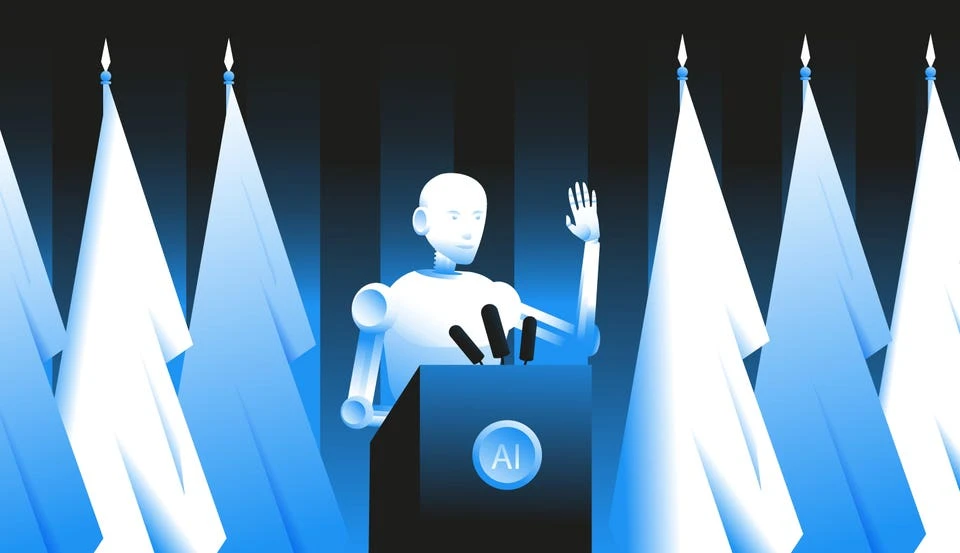In An Increasingly Complex World, Is It Time For An AI President?
In the realm of science fiction, creatives often explored the concept of an AI president. However, as technology advances, this idea is edging closer to reality.
Impartial Decision-Making
People are often concerned about who might be influencing political leaders and the policies they create. A significant benefit of an AI president is its ability to make decisions based on data and logic. This allows for impartiality and freedom from personal bias or political pressure.
Unlike human leaders, an AI would not be swayed by emotions, personal relationships, or financial incentives. This impartiality could lead to more objective and fair policy decisions focused on the public good.
In economic policy, an AI president could analyze vast amounts of data to make informed decisions about fiscal policy, trade agreements, and taxation, ensuring decisions are made for the greater good rather than political expediency.
Lack of Human Judgment and Empathy
A critical limitation of an AI president would be the absence of human judgment and empathy. AI operates on logic and data, lacking the emotional intelligence necessary to understand the human aspect of decision-making, especially in complex sociopolitical contexts.
In responding to a national tragedy, an AI might fail to provide the emotional support and empathy that a human leader could offer, leading to a disconnect with the populace.
Efficient Problem Solving
AI systems excel at processing large volumes of information quickly. They can identify patterns and solutions. An AI president could utilize this capability to address complex national and international issues more efficiently and rapidly.
An AI president could swiftly analyze incoming data from various sources, coordinate emergency responses, and allocate resources optimally, potentially saving lives and minimizing damage.
International Diplomacy
International diplomacy often requires a nuanced understanding of cultural norms, historical contexts, and human emotions. An AI, with its data-driven approach, might struggle in diplomatic situations that require subtlety, tact, and a personal touch.
During international negotiations, an AI president might misinterpret cultural nuances or fail to build personal rapport with other world leaders, potentially leading to diplomatic faux pas or strained relations.
Transparency and Accountability
In a world of political spin, people find it difficult to understand who is truly responsible and accountable for positive or negative policy impacts. An AI president could operate with a level of transparency unattainable for human leaders.
For any policy implemented, the AI could provide citizens with a detailed explanation of its decision-making process. This includes the data used and anticipated outcomes, thus enhancing public understanding and trust.
Potential for Bias in Programming
While an AI president’s decisions may be transparent, the training data and decision rules provided to the AI system may not be so visible. AI systems are only as unbiased as the data and algorithms they are built upon.
There is a significant risk that an AI president could perpetuate and amplify existing biases. This could lead to unfair and discriminatory policies, creating a highly problematic situation.
Long-term Planning
Human political leaders often focus on short-term gains, sometimes at the expense of long-term welfare. An AI president, free from the constraints of election cycles, could prioritize long-term strategies.
For instance, in environmental policy, an AI president could implement strategies for climate change mitigation that extend beyond immediate political considerations, focusing on long-term environmental sustainability.
Dependence on technology and Loss of Human Skills
Relying on an AI for presidential responsibilities could lead to an over-dependence on technology, potentially eroding human political and leadership skills. This might create a situation where humans are underprepared to manage a crisis effectively in the event of technological failures.
Eliminating Corruption and Patronage
AI presidency could significantly reduce, if not eliminate, corruption and patronage in politics. An AI president would not be susceptible to corruption, nepotism, or favoritism, leading to a more meritocratic and fair government.
Ethical and Moral Decision-Making
AI lacks the ability to make ethical and moral judgments in the same way humans do. In situations that require a balance of ethical considerations, an AI might struggle to weigh complex moral dilemmas against logical outcomes.
Striking a Balance: AI Presidential Assistant?
The concept of an AI president represents a radical shift in the way we think about leadership and governance. While it offers numerous potential benefits, it also raises complex ethical and practical challenges.
Perhaps the solution is not replacing a human president but rather complementing one with an AI presidential assistant. This would employ hybrid intelligence. A human president would leverage the AI presidential assistant for objective and rapid analysis, recommendations based on logic rather than polls and patronage, and understanding long-term and horizontal impacts.
However, the human president would retain and make the actual policy decisions. This ensures empathy, ethics, and Other human factors are incorporated into the decision-making process.
As AI technology continues to evolve, it’s crucial to engage in informed discussions about its potential role in governance, ensuring that if ever implemented, it aligns with the broader goals of society and human welfare.
Source: forbes








No Comments